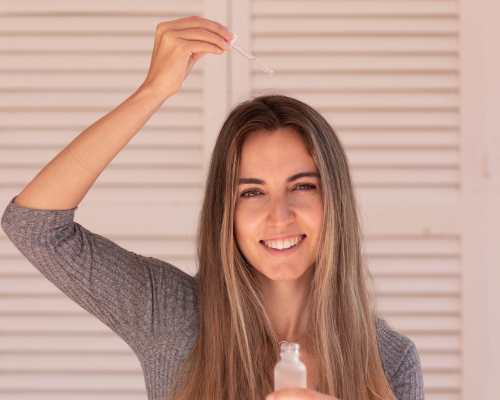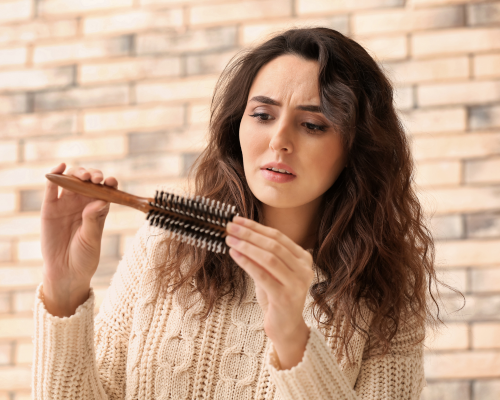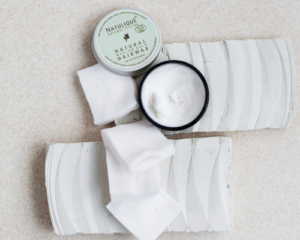Introduction to the application of essential oils for hair loss
Hair loss is a growing concern for many people around the world. While chemical and medical treatments are often used, more and more people are turning to natural remedies to alleviate this problem. Among these solutions, essential oils stand out as an effective alternative against hair loss. Used for centuries for medicinal purposes, essential oils are known for their beneficial properties on the scalp and hair follicles.
Definition of hair loss: Causes and symptoms
Hair loss is a natural phenomenon that everyone experiences to varying degrees. On average, it's normal to lose between 50 and 100 hairs a day, according to the American Academy of Dermatology. However, beyond this threshold, we speak of abnormal hair loss, which can be caused by a variety of factors.
- Cau geneti: Hereditary baldness is a frequent cause, known as androgenetic alopecia. It often affects men, but women are not exempt.
- Stress : physical or emotional stress can lead to temporary hair loss, which is often completely reversible.
- Hormonal imbalances : in women, imbalances due to pregnancy, childbirth or menopause can influence hair health.
- Nutrient deficiencies : a lack of protein, iron or other essential nutrients can weaken hair.
Symptoms :
- Progressive brightening : usually the first sign, often visible on the top of the head.
- Growth of bald areas : sudden hair loss can lead to the appearance of bald patches on the scalp.
- Progressive hair shrinkage: hair becomes finer and more fragile.
Understanding the effect of essential oils on hair
Essential oils are concentrated extracts obtained from plants. They contain the very essences of plants, making them particularly powerful. Used wisely, they can offer several benefits for the hair:
- Stimulation : they promote blood circulation to the scalp, which can stimulate hair growth.
- Balancing the scalp : they help regulate sebum production, fight infection and reduce inflammation.
- Nourishing : they provide essential nutrients needed for overall hair health.
In the following sections, we'll explore some of the most effective essential oils and how they can be used to combat hair loss.
The most effective essential oils against hair loss
Rosemary essential oil
Properties and benefits for hair
Rosemary essential oil is renowned for its stimulating and revitalizing properties. It promotes blood circulation to the scalp, helping to strengthen hair follicles. What's more, its antioxidant properties help protect hair against damage caused by free radicals.
How do I use it?
To reap the benefits of rosemary essential oil, we recommend adding it to a carrier oil, such as coconut oil or jojoba oil. Apply this mixture to the scalp using circular movements to maximize penetration. Leave for about 30 minutes before rinsing.
Ylang-ylang essential oil
Properties and benefits for hair
Ylang-ylang essential oil is renowned for its ability to balance sebum production. It helps prevent dry, brittle hair, while promoting hair growth. Ylang-ylang also has a relaxing action that can help reduce stress, a factor often linked to hair loss.
How do I use it?
Add a few drops of Ylang-ylang essential oil to your usual shampoo or conditioner. You can also create a hair mask by mixing it with a vegetable oil. Leave the mask on for 20-30 minutes before washing your hair.
Atlas cedar essential oil
Properties and benefits for hair
Atlas Cedar essential oil has astringent and purifying properties that help regulate sebum production. It is also known to promote blood circulation, which can help stimulate hair growth and slow hair loss.
How do I use it?
Mix Atlas Cedar essential oil with a carrier oil, then gently massage the mixture into your scalp. Leave for at least 30 minutes before rinsing. For best results, try to repeat this process once or twice a week.
Lavender essential oil
Properties and benefits for hair
Lavender essential oil is well known for its soothing and antimicrobial properties. It helps calm scalp irritations and promotes a healthy environment for hair growth. What's more, its relaxing fragrance helps reduce stress, indirectly improving hair health.
How do I use it?
Apply a few drops of lavender essential oil mixed with a carrier oil to your scalp. You can also make it part of your night-time routine by adding a few drops to your pillow to benefit from its calming effects while you sleep.
See also: Common mistakes to avoid when washing hair
How to incorporate essential oils into your hair routine
Direct use on the scalp: Techniques and advice
Incorporating essential oils into your hair routine can bring essential benefits for the health of your hair. The key is to use these oils correctly and carefully to maximize their effects and avoid any potential irritation.
Choosing the right carrier oil
- Coconut oil: known for its moisturizing properties, it is ideal for dry, sensitive scalps.
- Jojoba oil : similar to human sebum, it regulates the scalp's natural oil production.
- Argan oil : rich in nutrients, it offers additional protection against external aggressions.
To dilute essential oils, mix 2 to 3 drops of essential oil with a tablespoon of the chosen carrier oil.
Scalp massage method
- Circular motion : insist on gentle, circular movements to stimulate blood circulation.
- Light pressure : avoid pressing too hard to avoid irritating your scalp.
- Special zones : Focus on areas that seem thinner or prone to hair loss.
Massaging your scalp with the prepared oil for around five to ten minutes can bring a feeling of relaxation while strengthening your hair roots.
Integration into hair care products
- Shampoo : add a few drops of essential oil to your usual shampoo for a therapeutic boost every time you wash.
- Conditioner : combine them to extend the nourishing benefits of your skincare routine.
- Hair masks : By combining them with a hair mask, you can offer your hair an intensive, targeted repair treatment.
Safety tips
- Patch-test : before any extensive use, perform a patch test to check your skin's tolerance.
- Sensitivity : in case of sensitive scalp, prefer mild oils such as chamomile or the rose.
- Quantity : Always follow recommended dosages to avoid over-concentration.
Adapting essential oils to your personal needs not only stimulates hair growth, it also helps prevent hair loss naturally, without resorting to chemicals.
Regularity and follow-up
- Frequency : apply essential oils once or twice a week, depending on your scalp's natural tolerance.
- Monitoring results : document progress and adjust your routine according to the changes you observe.
- Consultation : Do not hesitate to consult a specialist if you have specific or persistent concerns despite the application of the oils.
By incorporating these natural practices into your skincare routine, you can not only curb hair loss, but also awaken its vitality and shine, while enjoying an experience of well-being with every use.
FAQ and Conclusion
Frequently asked questions (FAQ)
1. Can essential oils replace medical treatments for hair loss?
Essential oils can be an effective complement to medical treatments, but they should not replace professional medical advice. They are beneficial to hair health and can reduce hair loss, but it is always advisable to consult a specialist for a precise diagnosis.
2. How long does it take on average to see results with essential oils?
Results may vary according to the individual and the cause of hair loss. Generally speaking, regular use over several weeks is necessary to observe noticeable improvements. Patience and perseverance are essential when using essential oils.
3. Can essential oils be applied daily?
Essential oils are concentrated, and daily use is generally not recommended to avoid irritation. It's best to apply them once or twice a week, diluting them in a carrier oil.
4. Are there essential oils to be avoided by certain people?
Some people may be sensitive to certain essential oils, such as pregnant or breastfeeding women, children, and people with very sensitive skin. It is vital to carry out a patch test before use, and to consult a health professional if in doubt.
5. Can different essential oils be blended together?
Yes, mixing different essential oils can maximize their benefits. However, it's important to dilute them well and not exceed the recommended dosages to avoid any adverse reactions. A little experimentation may be necessary to find the best combination for your hair.
Conclusion
Incorporating essential oils into your hair routine offers a natural and effective way to combat hair loss. The beneficial properties of oils such as rosemary, ylang-ylang, Atlas cedar and lavender not only promote hair regeneration and growth, but also improve overall scalp health. By using these oils appropriately, incorporating them into hair massages or adding them to your hair care products, you can create a harmonious and beneficial wellness experience for your hair. That said, always remember that essential oils are not a substitute for medical treatment and should be used with care. By personalizing your approach and being attentive to the specific needs of your scalp, you can revitalize your hair while enjoying a natural and pleasant solution.




